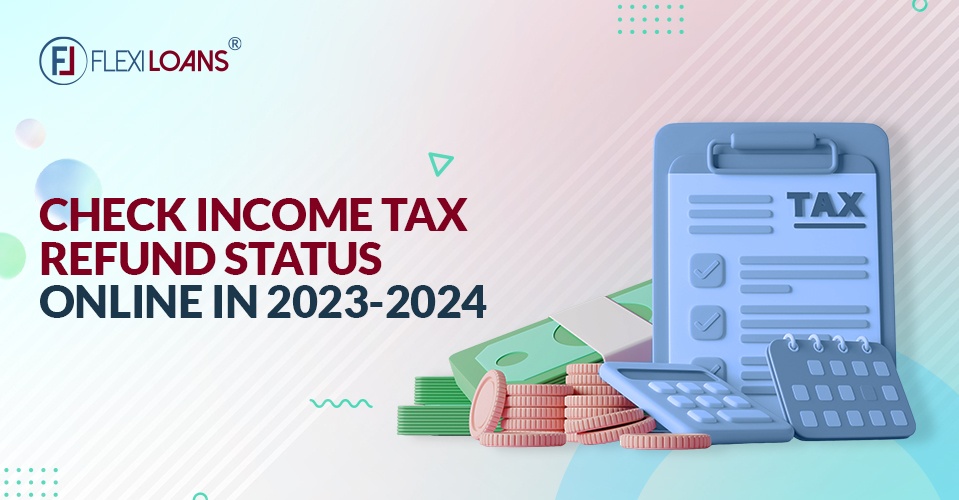May 01, 2023
Dec 03, 2025

A Comprehensive Guide to Income Tax Returns (ITRs)
Tracking your ITR refund status for 2023–2024 is simpler than ever. The Income Tax Department offers a user-friendly online platform where taxpayers can easily monitor the status of their refunds, including TDS refund status and e-filing refund status.
To stay updated on your refund status, follow this easy-to-follow guide that outlines the step-by-step process. Check refund status online for efficient financial management and informed business decisions.
What is Income Tax?
Income tax is a financial charge imposed by the government on individuals’ and businesses’ annual income. It is a crucial revenue source for public services, infrastructure, and government obligations.
Taxpayers must file annual returns to determine their tax liabilities, typically proportional to their income. The government also provides exemptions for certain investments, encouraging specific economic activities. Comprehending your income tax obligations and tax refund status is vital for effective financial planning.
What is Income Tax Refund?
An income tax refund is a reimbursement given to taxpayers when they overpay their taxes during a financial year. This excess payment occurs when their tax liability is less than the total amount paid through advance tax, self-assessment, or tax deducted at source (TDS).
Monitoring your ITR refund status is essential for efficient financial management and informed business growth decisions. Proper handling of tax refunds ensures a healthy cash flow and financial stability, allowing for business expansion through business loans with minimum documents and without collaterals.
To support your business growth and financial stability, FlexiLoans offers a hassle-free process for quick and immediate disbursal of funds. Take advantage of deducting the interest paid on your loan from your taxable income.
Check your business loan eligibility now to ensure efficient financial management and potential business expansion.
What Causes Delays in Income Tax Refund Processing?
- Inaccurate bank details: Providing incorrect bank account information can delay or fail your refund processing.
- Outdated/closed bank accounts: A closed or outdated registered bank account may cause a delay in the successful transfer of the refund.
- Refund claim under assessment: If your Assessing Officer (AO) validates your income tax refund claim, it may take longer to process the refund.
- Late filing of ITRs: Filing your ITR past the deadline may delay refund processing.
- Incorrect tax filing: Incorrect or incomplete information in your e-filing refund status can delay refund processing as authorities must verify and correct the data.
- Unreported income or discrepancies: Discrepancies between your reported income and the actual income may lead to additional assessments, causing a delay in refund processing.
What is the Process to Claim Income Tax Refund Online?
To claim an income tax refund online, follow these steps:
- Register on the e-filing portal: Visit the Income Tax Department’s e-filing portal and register using your PAN.
- Prepare and e-file your ITR (ITR): Choose the appropriate ITR form based on your income sources and financial transactions during the financial year. Fill in the necessary details, including income, deductions, exemptions, and tax payments (TDS, advance tax, or self-assessment tax).
- Claim refund in ITR: While filing your ITR, report the excess tax paid (TDS, advance tax, or self-assessment tax) in the relevant sections. The system will automatically calculate the refund amount you’re eligible for.
- Verify the ITR: After submitting your ITR, e-verify it using any available methods, such as Aadhaar OTP, net banking, or Electronic Verification Code (EVC) sent to your registered email and mobile number. Alternatively, you can send a signed ITR-V (acknowledgement) to the Centralized Processing Centre (CPC) within 120 days of filing your return.What is e-verification in ITR?
- EVC is a unique code generated through the Income Tax Department’s e-filing portal to verify taxpayers’ identity during online ITR filing.
- The code is sent to the taxpayer’s registered mobile number to confirm their identity.Faster refund processing: E-verification expedites the refund process, typically taking 40 to 45 days from the verification date.
- Taxpayers receive an intimation about their refund via email and mobile from the Income Tax Department before the refund.
- Pre-validating your bank account is mandatory to ensure the timely receipt of your income tax refund.
- Processing of ITR: After verifying your ITR, the Income Tax Department will process your return, verify the details, including your refund claim, and send an intimation under Section 143(1) to inform you about the outcome.
- Refund approval: The Income Tax Department will approve your ITR refund and transfer the amount to your registered bank account through Electronic Clearing Service (ECS) or issue a refund cheque post accepting your refund claim.
How to Check Your Income Tax Refund Status Online?
The two ways to check refund status online are:
A. The Income Tax E-filing Portal
B. The TIN NSDL Portal
A. The Income Tax e-Filing Portal
- Visit the income tax e-filing portal: Access the official e-filing portal for income tax-related services and information. Income Tax Department’s e-filing portal.
- Log in to your account: Enter your user ID (usually your PAN), password, and captcha code to log in. If not registered, create a new account by clicking “Register Yourself.”
- Access the “My Account” tab: After logging in, navigate to the “My Account” tab in the top menu.
- Select “Refund/Demand Status”: Choose “Refund/Demand Status” from the “My Account” drop-down list to view your ITR status.
- Review refund status: The “Refund/Demand Status” page displays details of filed returns and their respective refund statuses, including assessment year, status, reason (if any), and mode of payment.
- Check the TDS refund status: To check your TDS refund status, visit the TRACES website, log in with your registered credentials, and follow the instructions to access your Form 26AS.
- Understand the different refund statuses: Your refund status may display as “Refund Paid,” “Refund Failed,” “Refund Expired,” or “Refund Returned.” Each status provides insight into the income tax refund status and possible actions you need to take.
B. The TIN NSDL Portal
- Visit the portal: Access the TIN NSDL portal.
- Enter details: Input your PAN and select the assessment year you want to check the refund status.
- Enter the captcha code: Fill in the captcha code displayed on the screen and click “Submit.”
- Review refund status: The portal will display the refund status for the specified assessment year, providing information on the current state of your refund and any necessary actions.
Using either method, you can conveniently check your ITR refund status for FY 2022–23 online.
What tax benefits are offered by the Indian Government to individuals and businesses?
The Indian Government provides various tax benefits to individuals and businesses to encourage economic growth, promote investments, and offer relief to taxpayers. Some common tax benefits include:
Tax Benefits for Individuals:
- Deductions under Section 80C: Investments in life insurance premiums, Employee Provident Fund (EPF), Public Provident Fund (PPF), National Savings Certificates (NSC), and tax-saving fixed deposits.
- Home loan deductions: Deductions on home loan interest under Section 24(b) and principal repayment under Section 80C.
- Health insurance deductions: Premiums paid for health insurance policies for self, spouse, children, and parents under Section 80D.
- Education loan interest: Deductions on interest paid on education loans under Section 80E.
- Donations deductions: Contributions made to eligible charities and NGOs under Section 80G.
Tax Benefits for Businesses:
- Startups tax benefits: Tax holidays, exemptions, and concessions for eligible startups under various government schemes and initiatives such as Startup India, Section 80-IAC of the Income Tax Act, Angel Tax Exemption, Atal Incubation Centre (AIC), and Research & Development (R&D) incentives.
- Incentives for MSMEs: Lower corporate tax rates and exemptions from certain taxes for Micro, Small, and Medium Enterprises (MSMEs).
- Special Economic Zones (SEZs): Tax holidays, exemptions, and concessions for SEZ businesses to promote industrial development and boost exports.
- Exporters tax benefits: Exemptions from customs duties and service tax for exporters to encourage export-oriented growth.
- Research and development deductions: Deductions for businesses investing in research and development under Section 35 of the Income Tax Act.
What Tax Benefits are Provided on Business Loans?
Business loans are crucial for the growth and expansion of any business. Whether upgrading machinery, hiring employees, managing cash flow, or marketing, availing a business loan can help fulfil the financial requirements.
In addition, business owners can also enjoy tax benefits on the interest rate for business loans paid to the lender. The tax authorities of India provide tax benefits to lower the borrower’s tax liability. Proper planning and management of funds are necessary to avoid any financial mismanagement.
The Indian Government offers various tax benefits to businesses that have availed loans for their operations, including deductions on interest paid, depreciation, and capital expenditure.
- Interest paid on business loans: The tax authorities allow businesses to claim payments on the interest paid on loans as a deductible expense while calculating their taxable income.
- Collateral-free business loans: When businesses avail of collateral-free loans, they can claim the interest paid on loan as a deductible expense while calculating their taxable income.
- MSME Loans: Government provides concessional interest rates for businesses under the MSME category. The MSME loan interest rate paid is a deductible expense while calculating taxable income.
Achieve Your Business Goals with FlexiLoans’ Tax-Saving Business Loans!
Tracking your income tax refund status and understanding the tax benefits available to you is crucial for effective financial management. Applying for a business loan is also an essential step for businesses to grow and expand.
With the Indian government’s tax benefits for business loans, borrowers can enjoy tax deductions on interest paid and other expenses, lowering their tax liability.
At FlexiLoans, we help businesses focus on their goals without worrying about the funds. As a leading digital lending platform, it provides customised loan solutions with hassle-free application processes and quick disbursals.
Visit the FlexiLoans website to learn more about our business loan options, and start your loan application today!
FAQs
The Income Tax Department generally takes 3 to 6 months to credit the tax Deducted at Source (TDS) refund to the taxpayer’s linked bank account after filing their ITR (ITR).
The taxpayer will receive compensation in the form of an interest rate of 0.5% per month or a part of the month on the amount due if the income tax refund has been delayed. The Income Tax Department will calculate interest on the refund amount from 1st April of the assessment year till the date of refund disbursement.
The government requires taxpayers to report their income, deductions, and tax liability in an ITR for a specific financial year. However, an income tax refund pertains to the extra tax the taxpayer pays to the government, which the government returns to the taxpayer.
There is no limit to how many times you can file a revised return within the one-year time limit.
If you have not received your refund despite being processed as per the online TIN status, you should double-check the bank details you provided for any errors. You can raise a refund reissue request on the E-Filing portal if there are no errors.
The interest rates and fees for loans from FlexiLoans vary depending on the type of loan product, the loan amount, and the repayment period. The interest rates start at 1% monthly, with no hidden charges or prepayment penalties.







